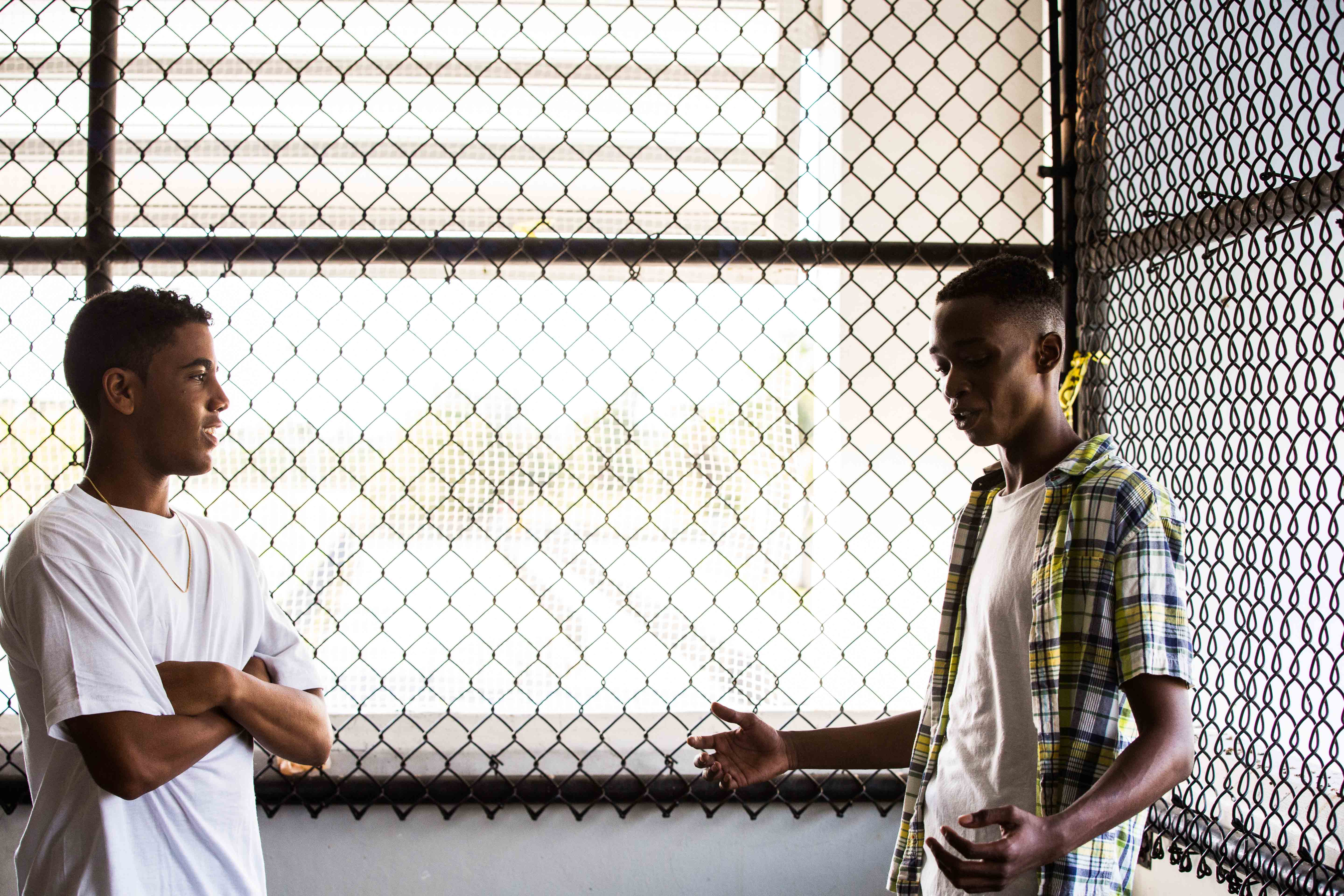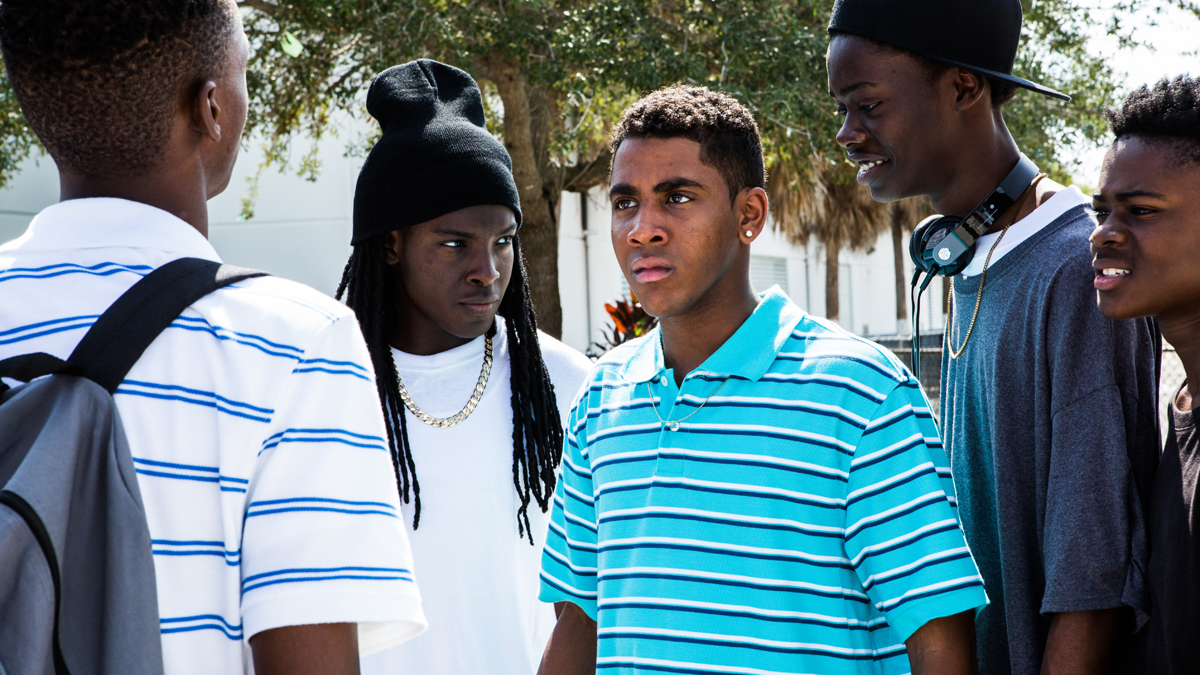Moonlight is not your typical coming of age story. The film, written and directed by Barry Jenkins, unfolds in three parts with minimal dialogue, and each character is meticulously well observed, as we’re given permission to track the complexity of their behavior through long takes and carefully crafted subtext. The film is not easy to watch and therefore not particularly entertaining in the traditional sense, yet it’s so powerful in its expression of love that it demands multiple viewings.
In the second section of the film, Jharrel Jerome plays Kevin, a high school classmate and friend of Chiron, the film’s protagonist. Both characters are painfully unsure of themselves at times—as all young people are—though Kevin is visibly more confident around his peers. But when the two of them are alone together, Kevin takes advantage of the freedom to be somebody else.
Utterly well deserving, Moonlight has been nominated for eight Oscars, including Best Picture, Best Director, Best Cinematography, and Best Adapted Screenplay (the script was based on Tarell Alvin McCraney’s play In Moonlight Black Boys Look Blue). Ahead of the ceremony on Sunday—and in anticipation of the film’s Blu-Ray/DVD/digital release this Tuesday, February 28—we gave Jerome a call to talk about the film.
Note: This interview contains mild spoilers.
Although Kevin sometimes comes across as a macho guy, he’s enormously tender in his treatment of Chiron when they’re alone. Reading the script, what did you find so compelling about the character that made you want to play him?
It was how vulnerable he was. Kevin has so many layers, especially because he comes off as something so different [from what he really is]. At some point in our lives, I think we all have this shell that we want to put on to protect ourselves from feeling embarrassed or out of place. Kevin definitely has that, and it’s almost like he’s hiding a little more than Chiron even, because he has a different persona in front of different people. By playing one character, I really got to play a bunch of different characters.
Throughout the film, the dynamic between Kevin and Chiron shifts. They’re playful friends who go on to experiment sexually, but things change dramatically after Kevin is pressured into hitting Chiron. How did you and Ashton [Sanders, who plays Chiron in the second portion of the film,] work together to prepare for those emotional scenes? Was there much rehearsal?
We actually did rehearse a lot, just one-on-one in the hotel room. There were a lot of times where we’d have the script in front of us and we’d read the lines back and forth just to get a sense of what we sounded like. When we got to the set, Ashton and I felt comfortable because the environment was there for us. Barry Jenkins’s direction was pretty much flawless; it was so easy to work with him as long as we knew and understood the script.
When it got to the harder stuff like the beach scene, it was something we knew had to be discussed before we got there because Ashton and I had to be on the same page. We realized that it was our job to tell the story and breathe life into these characters, and in order to do so we had to commit to it. After we understood that we needed to commit, all the preparation became easy.

Jerome and Sanders in Moonlight
You mentioned Barry being a flawless director; what did you know about him before the film? Had you seen his other work?
No, [and] I feel awful about that. But I got on a Skype call with him before I went to Miami, and from there I knew that he was really a chill and relaxed dude—really an honest person. My biggest fear was that he’d be a really scary director; I don’t know what that means, but I’d never been on a film set before! It was my first time on a professional film set and the only directors I’d worked with before were kids my age, so I didn’t know how it would be. But Barry was perfect; it was a very loose environment where we were encouraged to ask questions, and everything was always about us before it was about him. That feeling of family is what I needed, especially for my first [shoot]. And it wasn’t even like I was working with a director or a teacher for the first time; I was working with a collaborator on this beautiful project.
Can you recall a scene in the film that required you to dig deep into a difficult experience in order to connect authentically with the material?
The fight scene was definitely the hardest scene for me to film, because I’ve had friendships where you build a strong foundation, but there’s something that has to happen that tears it apart, or that you don’t know how to fix. I think we all go through that with friends, or [parents], or with anyone. I really felt a great connection with Ashton the entire shoot, but we shot that fight scene on my last day after we’d just been living it up in Miami and enjoying each other. In the scene he was giving me this pain, and even though I wasn’t really making contact with his face…that feeling of aggression toward somebody who I really do care about was tough.
“I’ve never hit someone who I loved like that, but sometimes we do emotionally hit people and hurt them without having to use our fists.”
I’ve never hit someone who I loved like that, but sometimes we do emotionally hit people and hurt them without having to use our fists. Sometimes our words are actions, and I’ve definitely hurt people who I’ve loved. So every time they’d say cut in that scene, I’d go off on my own and have to take deep breaths to relax. Plus, Barry was making sure we were amped up for the heaviness of the scene.
With the film being well and truly over, is there something in particular about playing Kevin that’s stuck with you?
Playing Kevin helped me see the humanity in people—that there’s more to a person than what’s on the outside. I think that’s something important that I took away from playing him, because his complexity helped me realize that the people who we all meet and see might have a mask on sometimes, but there’s more to them. Those complexities might be hard to grasp, [but] we can never really fully understand each other if we don’t try.
People become performers for different reasons. What are you exploring through acting?
Acting has always been the thing that feels right for me. I grew up playing sports and I was very academically inclined, trying to get the grades in order to be one of the first people in my family to graduate—so I had other aspirations, too. There was a time when I didn’t know what I wanted to do at all, but it was really in high school where that changed. It’s a time where you find yourself the most and go through phases, but the one thing that wasn’t a phase and didn’t change for me was acting.
It really came out of nowhere and hit me like a ton of bricks. Being someone else for a second allows you to become vulnerable, and that feeling was a rush to me. It’s the feeling that a quarterback gets when he throws a touchdown. Since then the feeling hasn’t changed, and now that I get to do projects like Moonlight and [the upcoming] First Match that will go out into the world and spread love and positivity, that makes everything ten times better. That makes the passion—and the work that I put in during high school—worth it. Now there is a voice that I have, and I love that. FL









